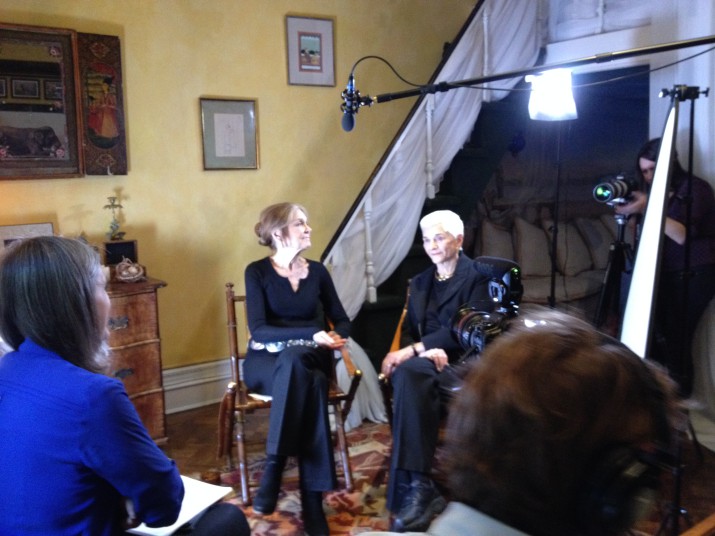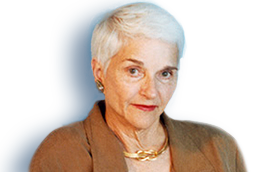About the Project
This project is the result of a five-year long initiative, supported over the past three years by a generous grant from the Creekmore and Adele Fath Charitable Foundation to the Bernard and Audre Rapoport Center for Human Rights and Justice at the University of Texas School of Law. It is centered on the life and work of Frances Tarlton “Sissy” Farenthold, as glimpsed through her papers, which are housed at the Dolph Briscoe Center for American History, and hours of original interviews the Rapoport Center conducted with Farenthold and many key people with whom she has worked over the years.
This website is separated into three principle sections, which represent different stages and focuses of her career: state (focused on her time in the Texas legislature from 1969-72 and her gubernatorial campaigns in 1972 and 1974); national (centered on her nomination to be the Democratic National Party’s vice presidential candidate in 1972 and her time as chair of the National Women’s Political Caucus beginning in 1973; international (covering her organizing and grass work activities for peace, disarmament, human rights and social justice primarily beginning in the late 1970s). Each section contains an original short film and a selection of documents and images from the Briscoe Center archives.
Of course, dividing Farenthold’s career in this way is somewhat artificial. As we make clear in the subsection on human rights activism under the international section, the local and global have long been deeply intertwined for Farenthold in her pursuit of social justice, dating back to her opposition to the Vietnam War. Indeed, it was our interest in that connection, and the fact that it was relatively unknown to those who had not worked directly with her on international issues over the past 35 years, that spurred this project.
Around 2010, the Rapoport Center learned that, although the Farenthold papers were housed at the Briscoe Center, they had not been identified as an archive related to international human rights. As often happens, Farenthold’s papers had been carefully processed when she donated them in the early 1970s. At that point, they primarily included her legislative papers and campaign materials. Over the years, however, she continued to donate papers from time to time, and they grew from approximately 50 linear feet to 160 linear feet. It had become impossible to keep up with them!
Much of the important work that Farenthold had done since leaving public office was sitting on the UT campus, but was not clearly identified by the finding aid available at the time. The Rapoport Center decided to do some preliminary research in the papers from the 1980s. Because of her own scholarly research, Professor and Rapoport Center co-director Karen Engle was particularly interested in identifying materials about the international women’s peace movement and the Peace Tent in Nairobi, Kenya that Sissy had helped organize. We were also generally interested in the many trips Sissy had taken as a human rights observer.
Law and undergraduate fellows and interns were sent to the archive, tasked with pulling relevant “jewels” that we might feature on what we imagined would be a modest online exhibit. The initial treasure hunt led to many historically significant documents, including many more on the international women’s peace movement than had been expected.
In spring 2011, the Rapoport Center recruited Gina Bastone to use some of the papers to design a capstone project for her Master’s degree from UT’s School of Information. Over the course of the summer, Bastone discovered Farenthold’s speech “Women’s Search for Peace” and decided to create a website based on it and the archival materials related to the events to which it referred. She also identified and created an inventory of many other files in the papers related to Farenthold’s human rights work.
Excited by the resulting website and the promise of making the Farenthold papers more accessible to researchers and the general public, the Rapoport Center applied for and received a three-year, $150,000 grant from the Creekmore and Adele Fath Charitable Foundation.
The grant was aimed at ensuring the preservation, full processing and detailed organization of the Farenthold papers, expanding the collection through videotaped interviews and the production of short films, creating this website, and hosting a conference celebrating Farenthold’s career and exploring the issues to which she has devoted her life.
We are pleased to announce that, with the help of more than forty people who have worked on and contributed to this project over the course of five years, we have completed those aims!

In addition to developing this site, which features innovative research and narrative explorations of Sissy’s life and more than 100 unique items from her papers, we fully processed Sissy’s papers and developed a complete finding aid. We shot over 36 hours of interview footage (see below for full list of interviewees), which we edited and combined with archival materials to create four original films on Sissy’s career. And, finally, we have hosted a conference to consider from both an historical and contemporary perspective many of the issues to which Sissy has dedicated her life, and to honor her boundless dedication to human rights and social justice.
No single project could possibly encapsulate all that is Sissy, as anyone who knew her can attest. But we have taken a first step. This website is a work in progress, and we will continue to add to and enhance it. If you have any comments about the site or items that should be featured, please send those to humanrights@law.utexas.edu. We welcome your feedback!
Acknowledgements
We are forever grateful to Sissy Farenthold, not just for being who she was, but for playing such an active role in this project and always being game for pretty much anything we proposed!
We are indebted to the Creekmore and Adele Fath Charitable Foundation for its support of the project. It is an honor to have their names associated with the project because Creekmore Fath served as campaign manager for Farenthold’s two gubernatorial races, and he and Adele Fath remained friends with Farenthold throughout their lives. Their support is also apt because not only was Creekmore Fath a 1939 graduate of the University of Texas School of Law, he studied economics at UT with Bernard Rapoport. They, too, became life-long friends and collaborators. One of their collaborations was Farenthold’s campaign for governor, to which Rapoport was a major financial contributor.
We are also grateful to the Alice Kleberg Reynolds Foundation as well as Olive Hershey Spitzmiller and AC Conrad, who have provided financial support along the way.
The following individuals made substantial contributions, some immense and some small, to the project:
Rapoport Center
Project direction and oversight: Karen Engle, William Chandler, Susan Smith Richardson, Charlotte Nunes, Gina Bastone, Julia Furlong, Sarah Cline
Filmmaking: Joe Bailey, Jr., Bennett Torres, Tom Aberg
Project assistance: Scholars and interns: Eunice Ali, Julie Bissinger, Brina Bui, Akira Conley, Eamon Dowd, Daniel Friedman, Leah Glowacki, Victoria Grefer, Rhiannon Hamam, Ana Hernandez, Melvin Huang, Travis Knoll, Courtney Lee, Kayla Oliver, Lalini Pedris, Collin Poirot, Catherine Wagner, Meredith Weaver, Heather Wong, Angela Yang (and many others!)
Briscoe Center
Project oversight: Brenda Gunn, Stephanie Malmros
Archival processing: Shannon Costello, Evan Hocker, Jessica Meyerson, Hal Richardson, Justin Kovar
UT Law Technology and Media Services
Amy Powell, Mark Gunn, Andy Martinez, Chris Martinez, Adam Norwood, Korey Pereira
Interviewees
Bill Aleshire, Jaime Anderson, Dave Atwood, Nicolas Avelar, Francie Barnard, Bob Borosage, Ada Edwards, Joe Eldridge, George Farenthold, Hamilton Fish, Lulu Flores, Denise Gilman, Scott Hendler, Francisco Lopez, Charles Moyer, Elliott Naishtat, Poppy Northcutt, Marcus Raskin, Gloria Steinem, Genevieve Vaughan, Linda Young, and Amy Goodman who conducted the interview between Gloria Steinem and Sissy Farenthold
Farenthold Family
Emilie Farenthold, George Farenthold, Rhiley Farenthold, Harvey Grossman
Assistance to filmmakers
Jeanne Adams, Alice Bailey, Allison and Joe Bailey, Trent Davies, Richelle and Jim Fatheree, Eve Smith
Rothko Chapel
Claudia Horwitz, Yma Luis
Consultation and Research
Tom Cohen, Sue Schechter
Dirty Thirty event
Tom Bass, State Rep. Ana Hernandez Luna, Terry O’Rourke, Ronnie Dugger, all the participants/attendees
And to the many others who have temporarily escaped our minds, but not our hearts…
Copyright and Intellectual Property
The Rapoport Center respects copyright law and will take all necessary steps to comply with it. If you would like to contribute information about the subject or creators of any of the items featured on this site, or if you would like to be credited as a creator, please contact the Rapoport Center at humanrights@law.utexas.edu. If you would like to submit a take-down request, please contact us.



